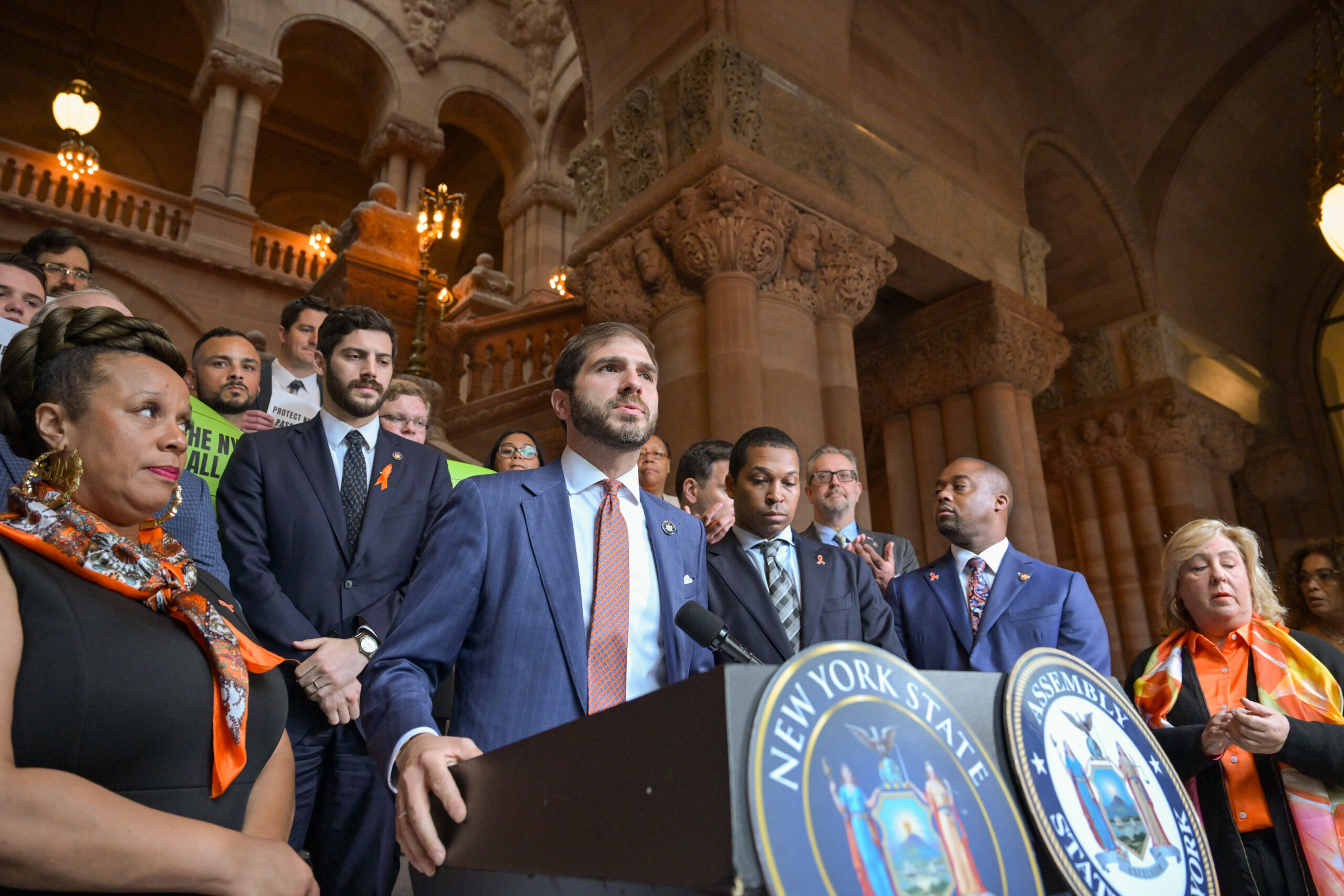Any young person in America can tell you this: our country is in the throes of an affordable housing crisis. Rents have spiked 30.4% nationwide between 2019 and 2023. Meanwhile, wages only rose 20.2% during that same period. Most Americans feel that housing costs are getting away from them. According to the Pew Research Center, about half of Americans say housing affordability in their local community is a major problem. That intuition is legitimate. The Joint Center for Housing Studies of Harvard University found that, in 2022, a record half of U.S. renters paid over 30% of their income on rent and utilities, with nearly half of those people paying over 50% of their income on rent and utilities.
How have housing costs outpaced wages so dramatically in such a short period of time? Sure, wages are sticky, which is why inflation stings middle- and lower-income households so sharply. But in a competitive market where landlords are competing to attract renters with steadily growing income, rents should not be eating half of our wallets. The unfortunate reality is that American housing markets are not competitive. Major corporate landlords are claiming an increasingly consolidated share of rental housing. However, these trends towards consolidation are being exacerbated by new ways of rigging the system—particularly the use of advanced algorithms.
Last month, the US Department of Justice (DOJ) Antitrust division formally launched its complaint against RealPage, a company alleged to have used a sophisticated algorithm to facilitate illegal price-fixing amongst competing landlords. The federal complaint came after lawsuits by state Attorneys General, including Arizona Attorney General Kris Mayes and D.C. Attorney General Brian Schwalb. According to the DOJ, “[RealPage] subverts competition and the competitive process. It does so openly and directly—and American renters are left paying the price.” At a high-stakes juncture for the American economy, the premise of this case—that an advanced software algorithm violated antitrust law—raises a host of novel conceptual questions with significant implications for American consumers.
Background
Price-fixing violations come under Section 1 of the Sherman Antitrust Act of 1890, which reads: “Every contract, combination in the form of trust or otherwise, or conspiracy, in restraint of trade or commerce among the several States, or with foreign nations, is declared to be illegal.” An early insight of the courts was that, technically, every contract involves some restraint of trade at some level. Hence, the courts interpret the Sherman Act to render illegal only “unreasonable” restraints of trade. In United States v. Addyston Pipe & Steel Co. (1899), the court distinguished between what Judge Taft (later Chief Justice and then President Taft) called naked restraints of trade and those “necessary and ancillary” to the effectuation of a lawful contract, the latter of which should be assessed by rule of reason analysis. But certain forms of anticompetitive conduct came to be understood as constituting such an obviously and blatantly unreasonable naked restraint of trade—such as the explicit agreement to fix prices at hand in Addyston Pipe, as well as explicit agreements to allocate markets or rig bids—that they are analyzed under a per se rule, a blanket rule prohibiting such conduct without regard to economic effects.
As a result, the evidentiary standard for price-fixing does not require economic evidence but rather depends on express communication (e.g., an email, a phone call, a meeting, etc.) between actors with the intent to set prices. Even if firms with significant market power collude tacitly (i.e., by following each other’s prices), thereby exacting a higher economic burden on consumers, the companies cannot be found to have violated the Sherman Act.
RealPage
RealPage did not broker any agreements to fix prices, nor did it host meetings for landlords to discuss allocating markets. So why is it being accused of violating Section 1 of the Sherman Act?
RealPage sells software that makes pricing recommendations to competing landlords based on their private data. Instead of landlords individually adjusting rent prices based on housing market dynamics, RealPage amalgamates lease-level information that would otherwise be walled off between competitors—about apartmental rates, rent discounts, rental applications, executed new leases, renewal offers and acceptances, and unit characteristics such as layout and amenities—and recommends ‘optimal’ prices. As a result, the algorithm acts as an intermediary with perfect knowledge, raising prices to their absolute maximum not just for the individual landlord, but for entire markets. Economic theory predicts that when producers collectively ensure common pricing, as is being influenced in this case by RealPage’s shared algorithm, the ‘optimal’ price, or monopoly rent, is higher than the price we would observe in a perfectly competitive market.
This is not just theory. When asked about the role RealPage has played in rents shooting up 14.5% in some markets, RealPage VP Andrew Bowen responded, “I think it’s driving it, quite honestly.” That number is particularly frightening when contextualized by the fact that RealPage’s clients allegedly comprise about 90% of the U.S. multifamily rental housing market. The software is widely used by competing landlords: for instance, ProPublica found that 70% of all multifamily apartments in a Seattle neighborhood were owned by just ten property managers—and “every single one used pricing software sold by RealPage.” The Arizona Attorney General’s case conservatively estimates overcharges of 12% and 13% in Phoenix and Tucson, respectively, as well as higher rates of eviction. The DOJ’s complaint highlights that RealPage was aware of and embraced the anticompetitive effects of its business model:
- RealPage aimed to suppress competition. The company’s Vice President of Revenue Management Advisory Services described, “there is greater good in everybody succeeding versus essentially trying to compete against one another.”
- RealPage contributed to higher prices. The company bragged about its tool “driving every possible opportunity to increase price even in the most downward trending or unexpected conditions.”
RealPage’s anticompetitive conduct did go beyond its software, however. The algorithm’s recommended ‘optimal’ pricing is only an optimal monopoly rent contingent on coordination among landlords. If some landlords deviate and undercut their competitors, the incentive for other landlords to continue charging high prices is weakened, if not irrational. In fact, RealPage actively expels clients that fail to impose suggested rents at least 75% of the time. While expanding its client base is crucial, the company understands that if universal compliance with its pricing scheme falters, natural competition will resume, leading to clients undercutting one another and ultimately threatening the viability of the client base—and potentially the business model itself, which relies on per-unit licensing fees and commissions on insurance premiums. Accordingly, RealPage worked hard to monitor landlord behavior with “pricing advisors” and made over 50,000 monthly phone calls to collect “nonpublic, competitively sensitive information.”
Analysis
Still, the case is unique. Most landlords never communicated with each other, agreeing not to compete, prices were not explicitly branded as collusive, and apartment providers were technically not forced to accept RealPage’s pricing recommendations. This is a bit of a sloppy argument, though: 1. RealPage employees’ have admitted as many as 90% of pricing recommendations are accepted, and 2. Participants in a cartel are never forced to accept; they just tend to find they can make a lot of money doing so. The fundamental question at play here is whether an intermediary algorithm getting rubber stamps for its decisions to inflate prices by individual sellers can be viewed the same as those individuals coordinating directly. The result appears to be the same, but this new method is cloaked in a “neutral” intermediary party, RealPage, that happens to stand to gain millions by acting as the middleman. RealPage won’t be the last time the courts will be pushed to update their understanding of antitrust law to encapsulate technology-driven anti-competitive practices. The housing market is not wholly and uniquely susceptible to abuse by algorithmic price-setting.While RealPage is paving the way, algorithmic price-fixing is on track to be the collusion of the future, and firms will increasingly find it in their incentive to model the behavior of RealPage in this case. As legal scholar Salil Mehra notes:
“Increased connectivity and more powerful computers have led to greater ability to collect mass data about prices, sales and market conditions. Additionally, these changes have created increased capacity to analyze this information and to set prices in rapid, automated fashion.”
So how should our legal apparatus approach such conduct? What happens when firms don’t make explicit agreements, but collude via a common algorithm? Mehra goes on to write:
“This shift away from humans to machines’ would pose a ‘critical challenge or antitrust law’ which was built on the assumption of human agency; machines ‘possess traits that will make them better than humans at achieving supracompetitive pricing without communication,’ and thus might not need to make an anticompetitive agreement as current blackletter American antitrust law requires for liability or punishment.”
The Federal Trade Commission (FTC) has clarified its position: price fixing by algorithm is still price-fixing. If a living person were to carry out the role of an algorithm in question, would the conduct be illegal? If the answer is yes, then the conduct is illegal whether by algorithm or not. But the FTC—an enforcement agency—doesn’t get to interpret the law; Courts do.
US v. Topkins (2015) was the first criminal prosecution of an algorithmic price-fixing conspiracy. In that case, poster- and wall decor-selling competitors explicitly agreed to compete on Amazon and to use a software algorithm to coordinate prices. The conspirators took a guilty plea deal, so the case never went to trial. While the use of a price-setting algorithm made the case the first of its kind, it was also conventional in legal terms—the conspirators explicitly agreed to use this tool to coordinate their pricing.
Other previous cases have condemned the facilitation by third parties of explicit agreements (not using algorithms) to fix prices or allocate markets between competitors. These are called hub-and-spoke conspiracies. For example, consulting firm AC-Treuhand committed antitrust violations similar to RealPage’s alleged conduct insofar as it collected information from competitors and facilitated the creation of a cartel—absent the algorithm. Furthermore, the DOJ has filed a lawsuit against Agri Stats Inc. for organizing extensive information sharing between chicken, pork, and turkey processors. The DOJ alleges that Agri Stats violated Section 1 of the Sherman Act by creating comprehensive weekly and monthly reports for the participating meat processors, containing hundreds of pages of data on costs and sales prices by individual companies, and using that data to recommend and even encourage raising prices and restricting supply. RealPage may have found a novel way to do things which competition case law has shown time and time again to violate antitrust law—like sharing sensitive data to a common third party as a form of collusion—but the novelty of the tool does not absolve the conduct’s economic harms. The FTC wrote in a recent legal brief on algorithmic price-fixing that, even when absent explicit communication or agreement, price-fixing driven by algorithmic tools still hurts consumers by “join[ing] together separate decision-makers” and thus “depriv[ing] the marketplace of independent centers of decision-making.”
This gets to the heart of the justification for antitrust laws. Antitrust laws are meant to protect free market competition for the sake of maintaining low prices, high quality, and vigorous innovation for the consuming public. The key logic there is that prices are maximally efficient conditional on firms competing against one another. Low prices in and of themselves—for example, beneath the expected perfectly competitive price—are not beneficial, as we would see supply shortages. Therefore, it is difficult to find firms in violation of the antitrust laws on the basis of price fluctuation alone, even if those fluctuations seem to occur in industry unison. Price hikes could be driven by external variables, such as natural disasters or pandemic-induced supply shocks, contributing to higher costs. Hence, antitrust law generally tends to rely on evidence of explicit agreements to determine Section 1 liability.
But this opens a loophole in the law with respect to algorithmic price-fixing, where there exists no explicit communication, but there does exist hidden collusion. Tacit collusion (which is perfectly legal under the law today, i.e. a firm consistently follows a rival’s price hikes, but no agreement as such exists) has never looked like this before. As Mehra explains, “increased ability to gather and process massive amounts of data will reduce the probability that coordinated pricing would break down due to error or mistake in assessing market conditions.”
If an individual landlord were to raise prices to the monopoly rent, they would lose business to competitors undercutting them. But when producers in a market coordinate prices, either expressly or tacitly, they can all make higher profits at the higher price. The risk is that one producer may try to cheat the others by undercutting them and capturing the market in the short-run, in response to which the whole market will return to the lower competitive price and all those producers lose out on the high cartel profits going forward. An algorithm acting as an intermediary with perfect knowledge eradicates the incentive to undercut one’s fellow cartel participants for short-term profits, because the software’s strong monitoring capabilities can help the other producers lower their prices in immediate response to a cartel cheater. It follows that the cartel cheater would never expect to get short-term profits and, therefore, would never have an incentive to cheat the cartel in the first place. Hence, algorithmic collusion—even without express agreement—actually makes cartels more sustainable by eliminating the incentive for any firms to deviate from the algorithm’s recommended supracompetitive prices, which is bad news for consumers.
Solutions
If the court makes the right decision, the DOJ will win its case, thereby setting in precedent the aforementioned reasoning the FTC has outlined in a simple heuristic: “your algorithm can’t do anything that would be illegal if done by a real person.”
However, to leave no margin for error, Congress should pass the Preventing Algorithmic Collusion Act, introduced by Senators Klobuchar (D-MN; Chairwoman of the Senate Judiciary Subcommittee on Competition Policy, Antitrust, and Consumer Rights), Durbin (D-IL), Blumenthal (D-CT), Hirono (D-HI), Wyden (D-OR), and Welch (D-VT). The bill would codify into law that direct competitors are presumed to have entered a price-fixing agreement when they “share competitively sensitive information through a pricing algorithm to raise prices.” Lead sponsor Senator Ron Wyden said:
“Setting prices with an algorithm is no different from doing it over cigars and whiskey in a private club… Although it’s my view that these cartels are already violating existing antitrust laws, I want the law to be painfully clear that algorithmic price fixing of rents is a crime.”
Collusion is collusion, and it hurts consumers. The point of the antitrust laws is to protect consumers from such naked restraints of trade. However, the Sherman Act, passed in 1890, needs to be supplemented by regulation that adapts our competition policy to new kinds of 21st century anticompetitive conduct. While RealPage is hurting renters, private cases have also been brought against alleged algorithmic conspirators in the hotel and casino industries. Passing the Preventing Algorithmic Collusion Act will help enforcers go after corporate colluders set on rigging markets to their benefit, at the expense of the public and the American economy.



